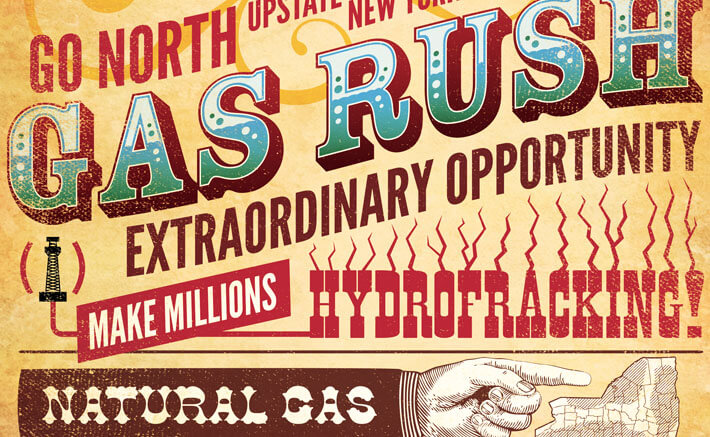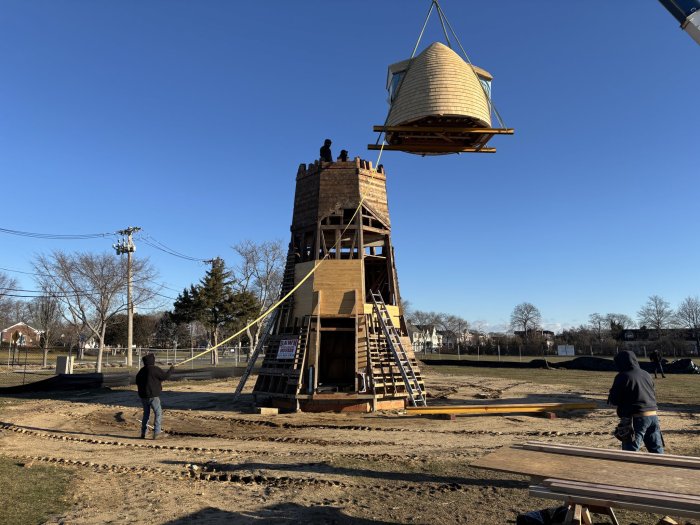To explain the process of hydrofracking and allay public fears, Talisman Energy—a global oil and gas company headquartered in Canada, which was cited 164 times in 2010 by the Pennsylvania DEC for violations regarding its operations there (12 times so far this year, according to the company) — designed a 24-page children’s coloring book, Talisman Terry’s Energy Adventure. Talisman Terry, “your friendly Fracosaurus” it reads—an always-smiling cartoon dinosaur wearing a hard hat and construction clothes—made his debut online and at community events and county fairs on the Pennsylvania/New York border this year.
“During the drilling process, you may see a lot of big equipment, including a drill rig, large trucks, and tanks of water,” Terry says on one page, while driving a truck. “The area where the well will be drilled is cleared, with the dirt saved so that it can be used later on to reclaim the land. This means it will look the same as before, once the well is no longer in use,” he grins on another, while a deer looks on in the background.
“Because there is only so much gas under the ground, one day the well stops producing gas,” he continues, shovel in hand and a smiling sun hovering above. “At this time, the well is closed, and the land is reclaimed and returned to the way it was before Talisman came to drill.”

The coloring book’s “After Drilling” page shows an unchanged landscape, besides the addition of an oil well. The smiling sun is joined in the sky by a rainbow and an eagle soaring above a forest.
“That rainbow was trapped underground but the fracking set it free!” mocked comedian Stephen Colbert, holding the book up in a recent segment of Comedy Central’s The Colbert Report. “Unless that’s not a rainbow but a geyser of highly combustible neurotoxins in which case, kids, you’ll want to color it brown.”
Rep. Ed Markey (D-Mass.) also weighed in on the propaganda before an Energy and Mineral Resources and Agriculture Joint Subcommittee oversight hearing last month:
“The loveable dinosaur playfully promotes the benefits of natural gas and paints a picture of a magical world filled with smiling rocks and grinning animals,” said Markey. “The problem is that unless you are a ‘Frack-a-saurus’ named ‘Talisman Terry,’ this world doesn’t exist. For communities around this country the expansion of natural gas drilling and hydraulic fracturing has meant contamination of water supplies, loss of property value, deteriorating health conditions, dead livestock, and destruction of pristine forest and agricultural lands.”
The company stopped distributing the book shortly thereafter, yet the incident exemplifies the lengths energy companies will go to further their cause. The current debate among lawmakers in Albany is equally combative.
“We take water for granted in New York State,” Assemb. Robert Sweeney (D-Lindenhurst), chairman of the Assembly’s Committee on Environmental Conservation, explains to the Press. “Somebody at one of my recent hearings said that New York is to water what Saudi Arabia is to oil!”
Sweeney’s held many hearings on hydrofracking and plans to hold another one later this fall once the DEC’s report is finalized; on the other hand, the state Senate has not held any formal hearings on this issue, according to Scott Reif, a spokesman for state Senate Majority Leader Dean Skelos (R-Rockville Centre).
“For upstate, especially the Southern Tier, safe drilling for natural gas has the potential to create thousands of new jobs and millions of dollars in economic investment, as well as provide a new source of revenue for localities,” Skelos said in a formal statement. “We need to let the experts determine the environmental impact of hydraulic fracturing as we also consider the potentially substantial boost for areas of the state that are in dire need of jobs.”
“If done safely, he’s said this can be a potential boon for the economy throughout the state,” Reif explains, and “that’s why we’re allowing the DEC to take the lead on this. The DEC has issued their report, and that seems to be what they have said.” [Both houses of the New Jersey Legislature passed a bill last month to ban hydrofracking.]
“We need to ensure that the health and safety of New Yorkers are protected before we undertake any industrial activity that has a history of problems,” Sweeney insists. “While I have an awful lot of confidence in the DEC and its commissioner, I also have an awful lot of questions.”
He notes that New York already has “over 1,700 Superfund sites and tens of thousands…of brown fields [contaminated lands]. We ought to take our time and get it right and not rush into anything that we will all pay for later. My guess is that in the end taxpayers will wind up cleaning up the mess as we have done for so many industries.
“Is it overall a net win for the state?” Sweeney asks rhetorically. “Right now I’d have to say, no, I don’t think it is.”


































